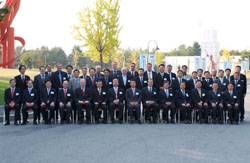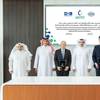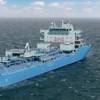14th Korean Shipbuilding Committee
In the last two years, shipowners have seen bunker prices increase by roughly 140%. Additionally, considering upcoming environmental regulations, shipowners pay more attention to an economical and environmental friendly way of transport. Responding to the ecological and economical demand for fuel consumption reduction, Dr Hermann J. Klein, Germanischer Lloyd Member of the Executive Board, presented the "GL FuelSaver" suite of new services. It includes the "CO2-Index Data Analysis" and the "Operational Fuel Consumption Analysis", which help shipowners and ship managers to understand fuel consumption patterns and identify technical and operational measures for reduction in fuel costs. Additionally, GL offers reviews and analyses for hull, machinery and the ship's operation to examine in more detail identified efficiency improving measures and their cost benefits ratios.
Stefan Höner, Area Manager, GL Korea/Philippines, gave an overview about “Germanischer Lloyd activities in .” Representatives of seven Korean shipyards gathered in Busan in April 2008 for the inaugural meeting of the Germanischer Lloyd Hull Technical Committee. His speech also included a future outlook of the newbuilding situation and the containership newbuilding sizes in from 2008 till 2012.
In his presentation "Future Development of Stability regulations", Mr. Jan Schreiber, member of the Stability Department of GL, informed the Committee about the ongoing work on the revision of the Intact Stability Code and about the latest considerations within IMO to possibly amend the forthcoming damage stability requirements of SOLAS 2009 in the coming years. For the revision of the IMO Code on Intact Stability, in depth research is currently being performed within the relevant correspondence group to develop stability criteria suitable to assess the dynamic stability of vessels. In case of SOLAS 2009, possible amendments could affect amongst other items the consideration of trim for the calculation of damage stability or the assessment of the probability of long and high damages. The active role of Germanischer Lloyd in these regulation developments was pointed out and the participants of the Committee were invited to cooperate with GL in these and other developments.
Workmanship and quality are the main components regarding the safety discussions. Tanjo Sinovcic, Technical Manager GL Korea/Philippines and , reported about this issue in his speech “Workmanship + Quality = Safety.”
Germanischer Lloyd’s first Korean base was opened in Busan in 1977. Further stations followed in and on . There are also branches in Changwon, Daegu, and . Today, a total of 204 people are employed by Germanischer Lloyd in , including surveyors and plan approvers. The focus lies on newbuilding classification. Furthermore, the world’s most powerful diesel engines for shipyards in and abroad are built as main ship’s propulsion units in where they are also certified by GL.
Recently on the SMM the Korean shipyard Hyundai Heavy Industries (HHI) has signed a contract for classification with GL, which adds seven 13,100 TEU Megaboxer to the GL orderbook: The containerships will go to German shipowner MPC Capital. In 2007, new orders secured by Korean shipbuilders recorded a historic high of 707 ships with 23.6 million CGT, which is a huge share surge of 45.2% in 2006. In addition, Korean shipbuilders increased their market share for new orders to 40% from 38% a year earlier. This is due to their comparative advantage in technology as well as the continued boom in the shipping market. In 2007, 12.8 Million GT were delivered with GL class from Korean shipyards. This makes the country with the largest number of GL classed deliveries in the past year.















